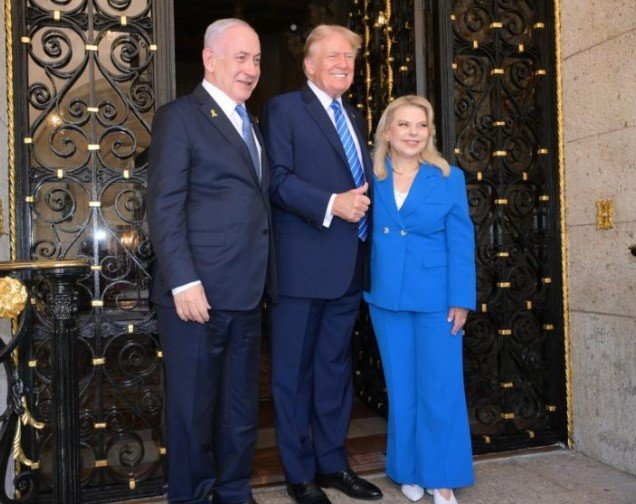As B-2 Bombers Hit Iranian Nuclear Sites, Critics Say ‘America First’ is Being Sacrificed for Tel Aviv’s Agenda
It was supposed to be the era of restraint. “No more endless wars,” Donald Trump had pledged on the campaign trail. But July 2025 tells a different story.
Just weeks after American B-2 stealth bombers helped Israel target Iran’s underground nuclear facilities, Washington is now facing a growing political storm at home—and deepening instability abroad. The U.S.-backed airstrikes, which pummeled Iranian sites in Isfahan, Fordow, and Natanz over a 12-day stretch, have cracked open an uncomfortable truth: the “America First” doctrine may be more slogan than strategy.
The ‘America First’ Trap: From Isolationism to Escalation
Trump’s second term was supposed to reverse decades of Middle East entanglements. Instead, it’s now tied to one of the most aggressive Israeli military campaigns in years. At the center of it all: U.S. involvement that many say was both unauthorized and politically reckless.
Two sentences here. Trump’s 2020 campaign—and again in 2024—promised to focus on Americans, not foreign battlefields. But sending stealth bombers into Iranian airspace? That wasn’t on the flyer.
White House aides have maintained that the operation was a “joint defensive necessity” after Israel claimed intelligence pointing to an imminent Iranian breakthrough on uranium enrichment. But that narrative is cracking under scrutiny.
Critics, including some conservatives who backed Trump in both elections, now see a contradiction.

MAGA Supporters Left Confused by Foreign Policy Shift
Backers of “America First” are wondering when the switch flipped. Why is the U.S. involved in a bombing campaign thousands of miles away, in a region Trump once vowed to exit?
One pro-Trump podcast host in Texas summed it up bluntly: “We didn’t vote for B-2s over Natanz. We voted for closed borders and cheap gas.”
And the discontent isn’t just talk radio noise. According to a July 27 Rasmussen poll:
-
61% of Trump’s 2024 voters said they’re “uncomfortable” with direct U.S. military involvement in the Iran-Israel conflict.
-
47% believe the strikes “go against the principles of America First.”
-
12% said they would consider supporting an independent conservative in 2028 if foreign entanglements continue.
That last number might seem small—but it’s enough to swing a primary.
Congress Cut Out of the Loop, Again
The decision to assist Israel’s offensive—without prior authorization from Congress—has ignited anger on Capitol Hill.
Multiple Democratic lawmakers, along with a few Republicans, are calling for hearings into the role of U.S. forces in the operation. Senator Mike Lee of Utah, a known advocate for restrained foreign policy, said in a floor speech: “This isn’t about Israel. It’s about the Constitution. If we’re bombing another country, the people’s representatives need to sign off.”
But the administration argues it was legal under existing defense cooperation agreements. Legal experts aren’t so sure.
There’s also confusion over what level of intelligence sharing occurred. Some reports suggest the CIA provided live satellite feeds during the raids. Others say American pilots coordinated directly with Israeli defense teams in real-time.
One sentence: No one in Washington wants to own the full story right now.
What Was Hit—and Why It Matters
Israeli jets focused on Iran’s underground nuclear facilities—locations long known to be fortified against conventional attacks. But without U.S. support, insiders say, the operation would’ve been impossible.
A senior Israeli defense official told Haaretz on background: “The B-2s were the only planes that could hit Fordow and get out clean.”
Here’s a quick breakdown of the targeted sites:
| Site | Location | Significance | Status Post-Strike |
|---|---|---|---|
| Fordow | Near Qom | Underground enrichment center | Heavily damaged |
| Natanz | Isfahan Prov. | Main uranium production hub | Operational halt |
| Isfahan | Central Iran | Storage for centrifuges, chemical stockpiles | Multiple blasts |
The long-term impact of these strikes is still unclear. Iran claims it has resumed partial operations and called the attack “an act of war.” Meanwhile, Hezbollah and Houthi militias have escalated cross-border rocket fire toward Israel and U.S. bases in Iraq and Syria.
Risk of Wider War Now More Real Than Rhetorical
There’s no denying it—this could spiral. Iranian proxies are already threatening maritime shipping in the Strait of Hormuz. A tanker carrying Qatari oil was forced to reroute last week after drone warnings near Bandar Abbas.
American forces across the Middle East are on heightened alert. U.S. bases in Kuwait and Qatar have reportedly moved to “Delta Plus” security status.
And in Lebanon, Hezbollah leader Hassan Nasrallah has warned of a “regional response” if more attacks occur. That message was echoed by Iran’s Revolutionary Guard in an ominous post on Telegram: “Every American warplane is now a target.”
One sentence: That’s not posturing—it’s a threat.
Trump’s Strategic Legacy Faces Its First Real Test
Trump’s advisors are split. Some, like National Security Adviser Kash Patel, insist the intervention will “stabilize the region.” Others are privately admitting that the president is risking his brand with a base that doesn’t want more war.
Timothy Hopper, a former State Department analyst and now foreign policy columnist, wrote in a viral thread: “Trump said America wouldn’t serve as Israel’s foreign legion. But in July 2025, that’s exactly what’s happening.”
Meanwhile, Biden allies have stayed mostly quiet, perhaps content to watch Trump tie himself to a regional firestorm.
The problem? That firestorm could reach American soil if the conflict escalates.
